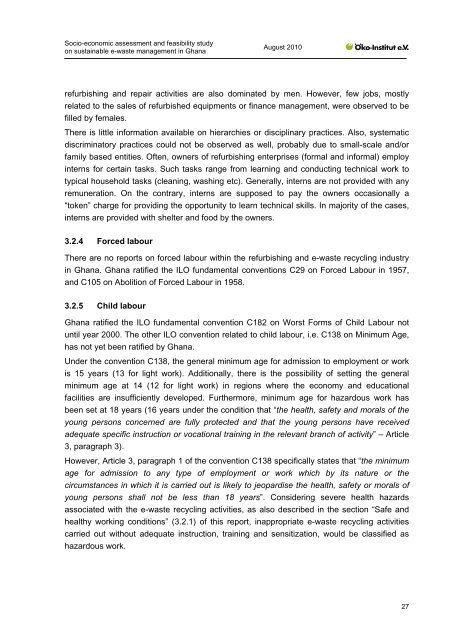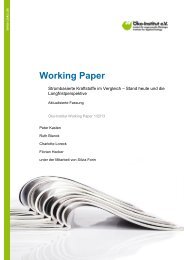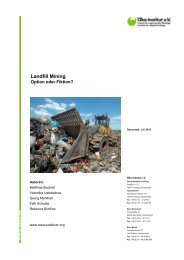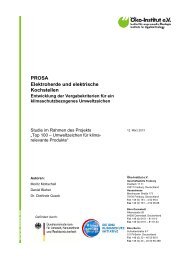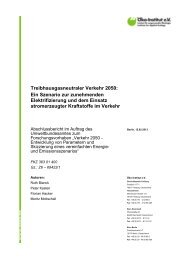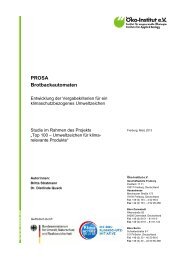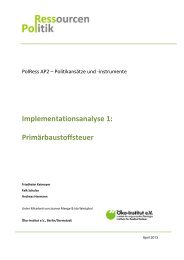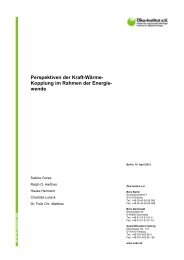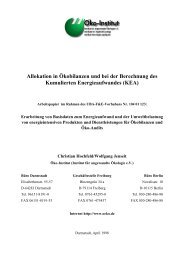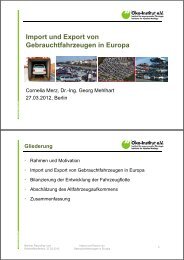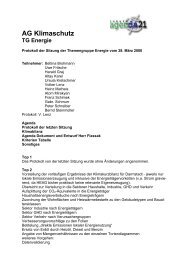Socio-economic assessment and feasibility study on - Öko-Institut eV
Socio-economic assessment and feasibility study on - Öko-Institut eV
Socio-economic assessment and feasibility study on - Öko-Institut eV
Create successful ePaper yourself
Turn your PDF publications into a flip-book with our unique Google optimized e-Paper software.
<str<strong>on</strong>g>Socio</str<strong>on</strong>g>-<str<strong>on</strong>g>ec<strong>on</strong>omic</str<strong>on</strong>g> <str<strong>on</strong>g>assessment</str<strong>on</strong>g> <str<strong>on</strong>g>and</str<strong>on</strong>g> <str<strong>on</strong>g>feasibility</str<strong>on</strong>g> <str<strong>on</strong>g>study</str<strong>on</strong>g><br />
<strong>on</strong> sustainable e-waste management in Ghana<br />
August 2010<br />
refurbishing <str<strong>on</strong>g>and</str<strong>on</strong>g> repair activities are also dominated by men. However, few jobs, mostly<br />
related to the sales of refurbished equipments or finance management, were observed to be<br />
filled by females.<br />
There is little informati<strong>on</strong> available <strong>on</strong> hierarchies or disciplinary practices. Also, systematic<br />
discriminatory practices could not be observed as well, probably due to small-scale <str<strong>on</strong>g>and</str<strong>on</strong>g>/or<br />
family based entities. Often, owners of refurbishing enterprises (formal <str<strong>on</strong>g>and</str<strong>on</strong>g> informal) employ<br />
interns for certain tasks. Such tasks range from learning <str<strong>on</strong>g>and</str<strong>on</strong>g> c<strong>on</strong>ducting technical work to<br />
typical household tasks (cleaning, washing etc). Generally, interns are not provided with any<br />
remunerati<strong>on</strong>. On the c<strong>on</strong>trary, interns are supposed to pay the owners occasi<strong>on</strong>ally a<br />
“token” charge for providing the opportunity to learn technical skills. In majority of the cases,<br />
interns are provided with shelter <str<strong>on</strong>g>and</str<strong>on</strong>g> food by the owners.<br />
3.2.4 Forced labour<br />
There are no reports <strong>on</strong> forced labour within the refurbishing <str<strong>on</strong>g>and</str<strong>on</strong>g> e-waste recycling industry<br />
in Ghana. Ghana ratified the ILO fundamental c<strong>on</strong>venti<strong>on</strong>s C29 <strong>on</strong> Forced Labour in 1957,<br />
<str<strong>on</strong>g>and</str<strong>on</strong>g> C105 <strong>on</strong> Aboliti<strong>on</strong> of Forced Labour in 1958.<br />
3.2.5 Child labour<br />
Ghana ratified the ILO fundamental c<strong>on</strong>venti<strong>on</strong> C182 <strong>on</strong> Worst Forms of Child Labour not<br />
until year 2000. The other ILO c<strong>on</strong>venti<strong>on</strong> related to child labour, i.e. C138 <strong>on</strong> Minimum Age,<br />
has not yet been ratified by Ghana.<br />
Under the c<strong>on</strong>venti<strong>on</strong> C138, the general minimum age for admissi<strong>on</strong> to employment or work<br />
is 15 years (13 for light work). Additi<strong>on</strong>ally, there is the possibility of setting the general<br />
minimum age at 14 (12 for light work) in regi<strong>on</strong>s where the ec<strong>on</strong>omy <str<strong>on</strong>g>and</str<strong>on</strong>g> educati<strong>on</strong>al<br />
facilities are insufficiently developed. Furthermore, minimum age for hazardous work has<br />
been set at 18 years (16 years under the c<strong>on</strong>diti<strong>on</strong> that “the health, safety <str<strong>on</strong>g>and</str<strong>on</strong>g> morals of the<br />
young pers<strong>on</strong>s c<strong>on</strong>cerned are fully protected <str<strong>on</strong>g>and</str<strong>on</strong>g> that the young pers<strong>on</strong>s have received<br />
adequate specific instructi<strong>on</strong> or vocati<strong>on</strong>al training in the relevant branch of activity” – Article<br />
3, paragraph 3).<br />
However, Article 3, paragraph 1 of the c<strong>on</strong>venti<strong>on</strong> C138 specifically states that “the minimum<br />
age for admissi<strong>on</strong> to any type of employment or work which by its nature or the<br />
circumstances in which it is carried out is likely to jeopardise the health, safety or morals of<br />
young pers<strong>on</strong>s shall not be less than 18 years”. C<strong>on</strong>sidering severe health hazards<br />
associated with the e-waste recycling activities, as also described in the secti<strong>on</strong> “Safe <str<strong>on</strong>g>and</str<strong>on</strong>g><br />
healthy working c<strong>on</strong>diti<strong>on</strong>s” (3.2.1) of this report, inappropriate e-waste recycling activities<br />
carried out without adequate instructi<strong>on</strong>, training <str<strong>on</strong>g>and</str<strong>on</strong>g> sensitizati<strong>on</strong>, would be classified as<br />
hazardous work.<br />
27


